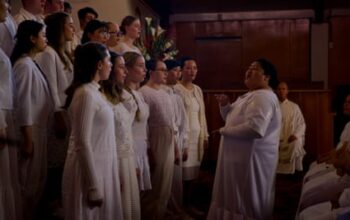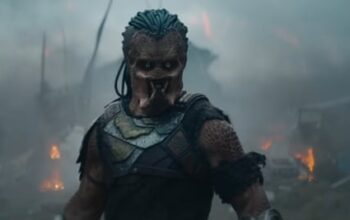If you liked Moo Deng, Thailand’s baby pygmy hippo who went viral last year, there’s still no guarantee that you’ll like Pepe – but how much hippopotamus-oriented media does one typically get in a year? A deeply strange, dreamy voyage into the consciousness of an adult hippo held captive in Pablo Escobar’s infamous private menagerie in Colombia, this fragmented fable from Dominican director Nelson Carlos De Los Santos Arias won the Silver Bear for best director at Berlin last year is now streaming exclusively on Mubi. Though it might give the eponymous beast a philosophical, impressively multilingual narrative voice, this isn’t a cuddly, anthropomorphised creature feature: the handsome pachyderm begins and ends the film an elusive mystery.
Pepe is an eccentric addition to a niche subgenre: grownup films centred on animals rather than humans. Outside nature documentaries, animal protagonists tend to be the preserve of animation and children’s fantasies: see the recently Golden Globe-honoured animal-apocalypse adventure Flow, hitting UK cinemas in March, while almost everyone has some Disney cartoon critter or other that caught their young imagination, be it Dumbo or The Lion King or the intrepid rodents of The Rescuers. (Or even the confusingly humanoid woodland creatures of Disney’s Robin Hood.) Somehow, adults are supposed to grow out of identifying with animals, and yet Pepe channels a more visceral form of that empathy.
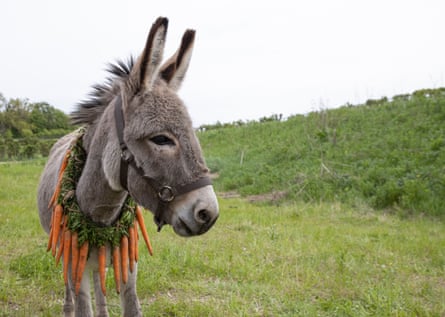
As did the Oscar-nominated EO a couple of years ago. Veteran Polish director Jerzy Skolimowski’s heady, violent, heartbreaking donkey odyssey through Europe achieved the effect via vertiginous point-of-view shooting, an immersive reinterpretation of a tale that French auteur Robert Bresson told far more austerely in his 1966 classic Au Hasard Balthazar (Apple TV+), another portrait of a humble ass subjected to human abuses and indignities. Neither one is a film for children, or indeed anyone who looks to animals for fuzzy comfort: both highlight our own worst, most self-serving behaviour as a species.
Andrea Arnold turned to nonfiction to make the same point in her bovine-eye-level farmyard exploration Cow, a rigorous, sometimes stomach-churning testament to the animal cost of industrial agriculture – and a film that surely minted many a vegan once it hit screens. Another great nature documentary of recent years, however, allows the animal kingdom some glamour and mystique. Marie Amiguet and Vincent Munier’s gorgeous The Velvet Queen (2020) is an ode to the snow leopard that treats the big cat as a sort of elusive femme fatale figure. Magnetising when the camera finds it, but as preoccupied with the act of looking – making us aware of our human gaze and its invasiveness in the beast’s remote habitat.
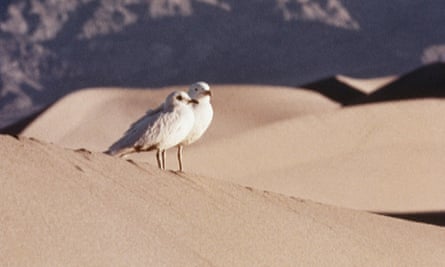
A more whimsical approach to entering the mind of an animal was taken in the 1973 would-be blockbuster Jonathan Livingston Seagull, an adaptation of a bestselling allegorical fable that caught a certain flower-child sensibility in its empowerment tale of a gull seeking self-realisation through flight. On the page it had a certain earnest charm; on screen it was hopelessly naff, matching sleek nature photography to clunky metaphysical voiceover and Neil Diamond songs that no gull would be caught dead squawking.
It may be harder to carry a story when the animal characters remain voiceless, but it’s to the film’s benefit overall. I remember being blown away as a young child by Jean-Jacques Annaud’s nearly dialogue-free survival story The Bear (1988), a technical marvel dramatising the trajectory of an orphaned bear cub in the wilds of Canada. Pure fiction, but with a ring of brute realism, its simplicity plays equally well to mature and juvenile viewers. It’s too little talked about these days, and hard to stream too: you need a Kanopy subscription, or else seek out physical media. Martin Rosen’s landmark animation Watership Down (1978), meanwhile, struck a rare, haunting balance between anthropomorphic fantasy with spiritual overtones and the harsh, risky reality of animals living in a man’s world. Once seen at a tender age, its stylised images of human threat and rabbit-on-rabbit violence never leave you.
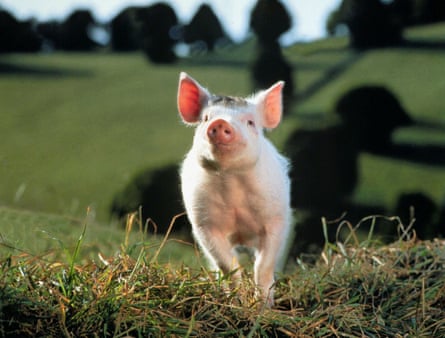
If you’ve subjected your children, or indeed yourself, to this trauma, soothe it with the wry, cosy comforts of Babe (1995), with its wonderfully lifelike animatronic effects work and fanciful tale of a plucky pig rising above the station of his species. Its animals have very human dreams and wishes; sometimes it’s simply more relatable to imagine them as cuter, furrier versions of ourselves.
Also new on streaming
The Second Act (Mubi) Quentin Dupieux’s latest meta-upon-meta comedy baffled many when it opened last year’s Cannes film festival, but that’s par for the course with the madcap Frenchman. You’ll either tune in or tune out early on to the loopy humour in this talky confrontation between four people whose fraught relationships might merely be the drama of a film they’re performing, but I had a blast.
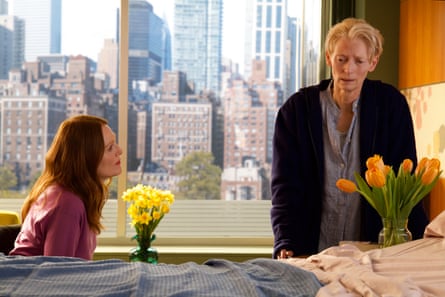
The Room Next Door (Apple TV+; from 13 January) Pedro Almodóvar’s first English-language feature won him the Golden Lion at Venice – the first time the Spanish veteran has ever taken the top prize at a major festival – but this mannered euthanasia drama is a mixed bag from him: a stiffly written two-hander that eventually blooms into florid, exquisitely lit melodrama, performed in contrasting registers by Tilda Swinton and Julianne Moore.
A Different Man Playing a struggling actor with neurofibromatosis whose life radically changes – not necessarily for the better – when he submits to a miracle cure, Sebastian Stan won a well-deserved Golden Globe for his antsy turn in Aaron Schimberg’s brilliant, quicksilver black comedy about vanity, ableism and self-image.
Source: theguardian.com
